Diary of Geoffrey Hampden Vernon - Part 1
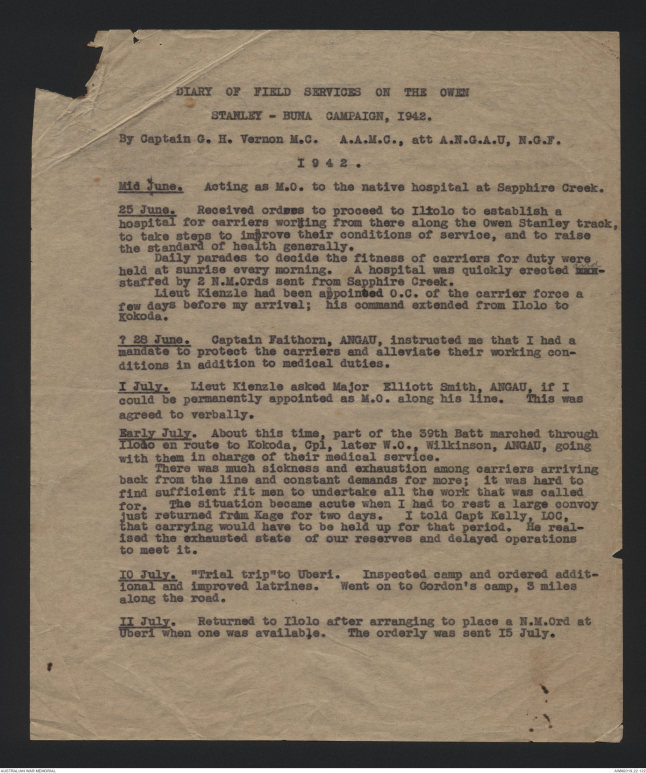
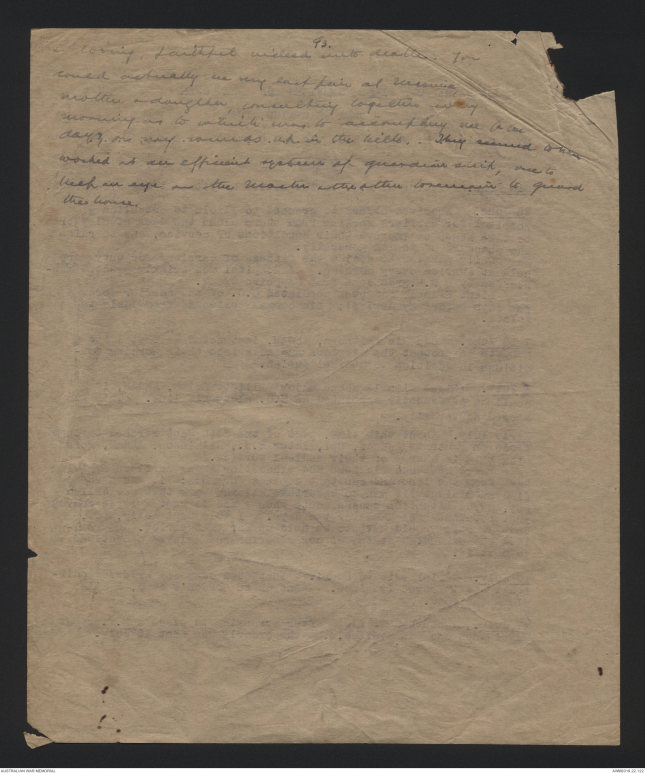
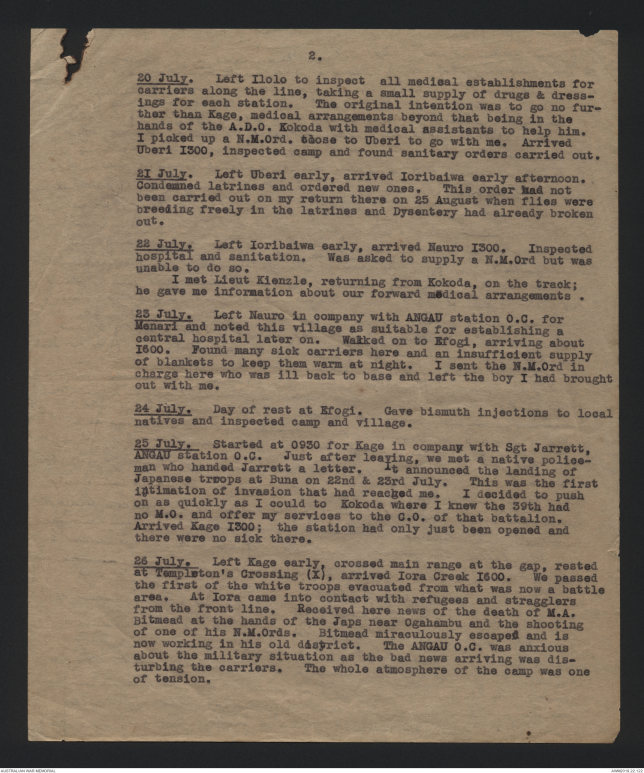
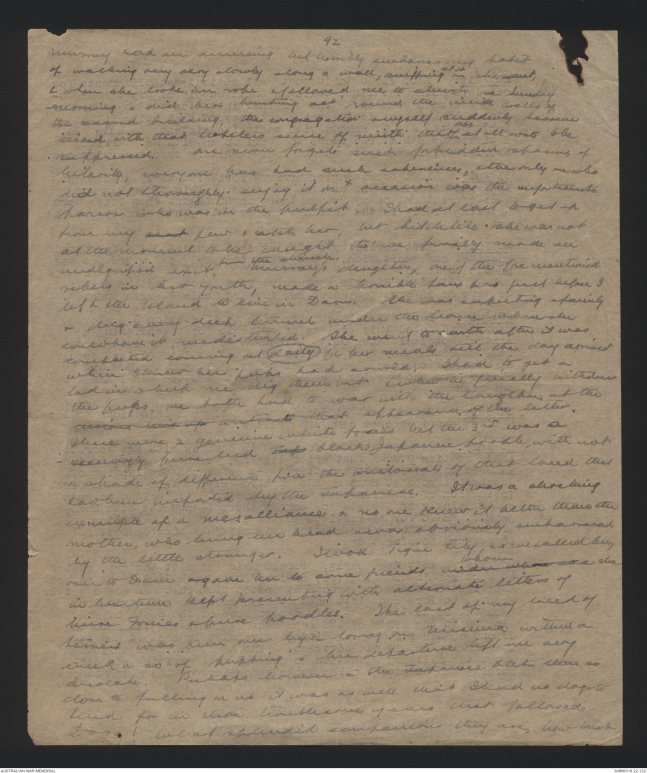
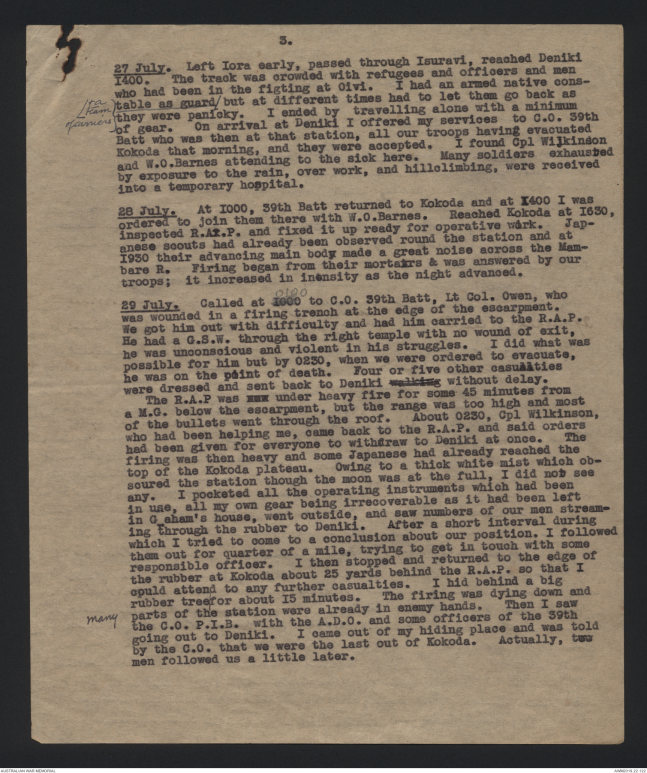
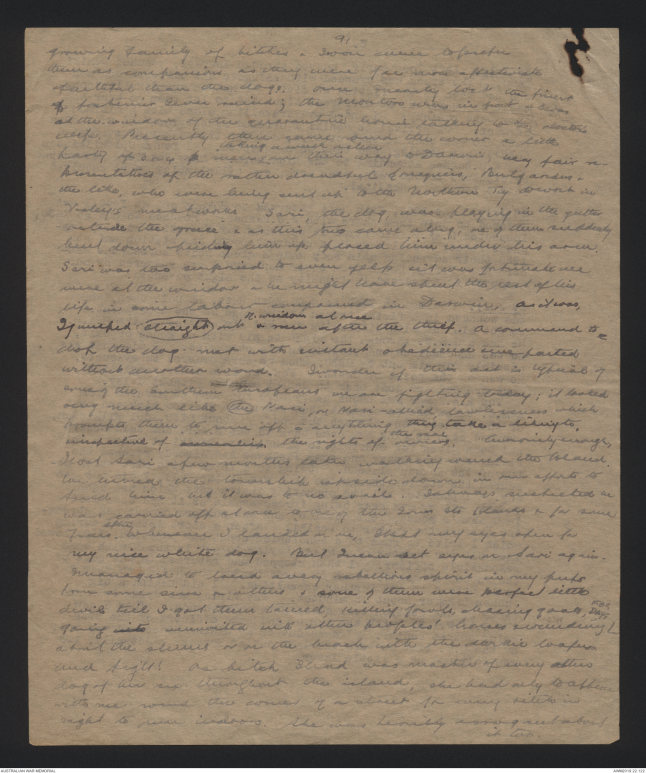
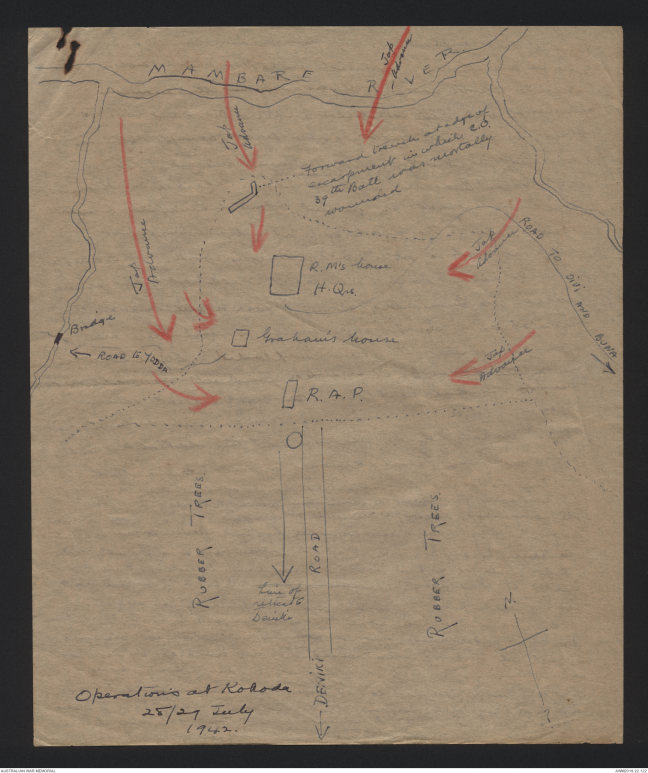
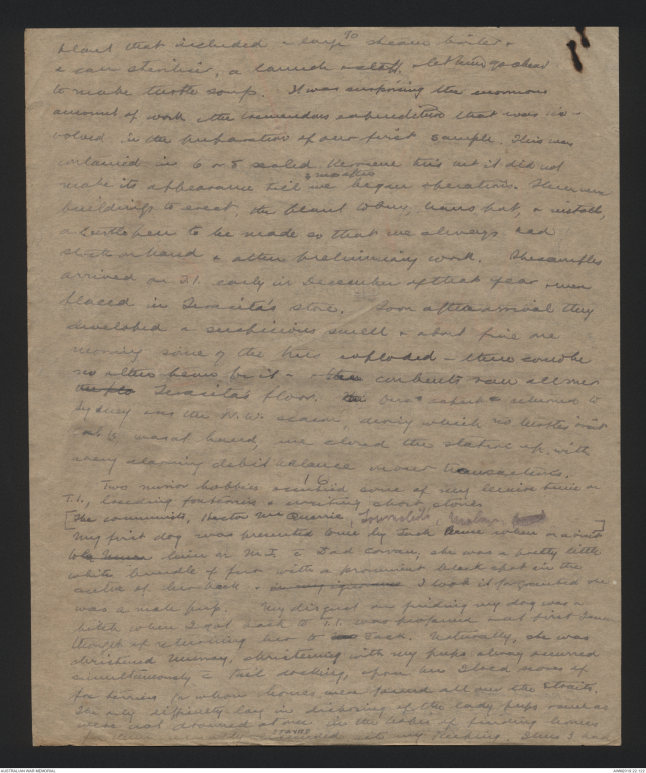
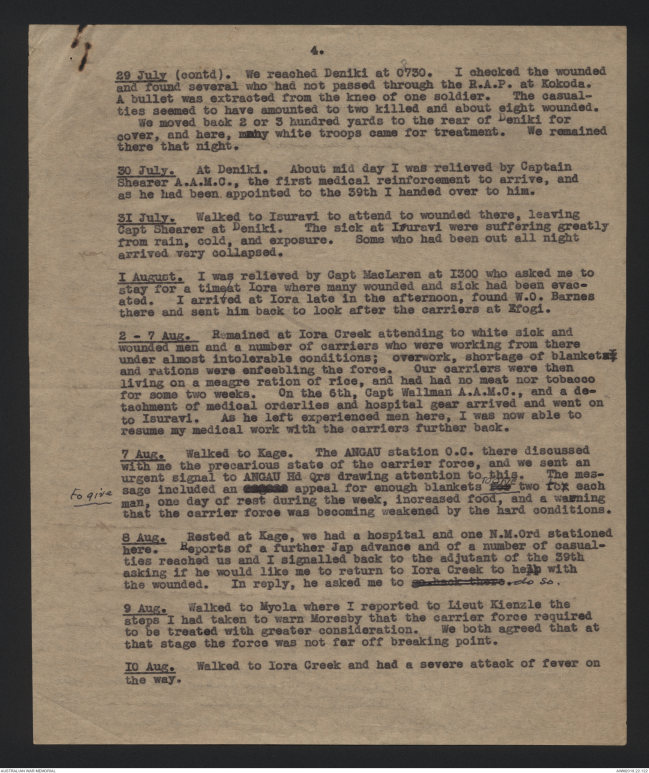
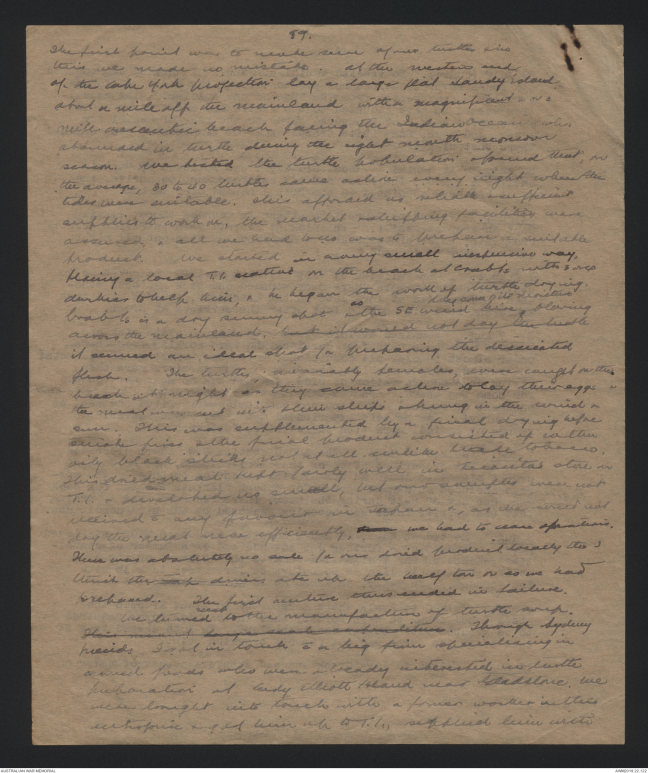
DIARY OF FIELD SERVICES ON THE OWEN
STANLEY - BUNA CAMPAIGN, 1942 .
By Captain G.H. Vernon M.C. A.A.M.C., att A.N.G.A.U, N.G.F.
1942.
Mid June. Acting as M.O. to the native hospital at Sapphire Creek.
25 June. Received orders to proceed to Iltolo to establish a
hospital for carriers working from there along the Owen Stanley track,
to take steps to improve their conditions of service, and to raise
the standard of health generally.
Daily parades to decide the fitness of carriers for duty were
held at sunrise every morning. A hospital was quickly erected xxx- ^and
staffed by 2 N.M.Ords sent from Sapphire Creek.
Lieut Kienzle had been appointed O.C. of the carrier force a
few days before my arrival; his command extended from Ilolo to
Kokoda.
? 28 June. Captain Faithorn, ANGAU, instructed me that I had a
mandate to protect the carriers and alleviate their working conditions
in addition to medical duties.
I July. Lieut Kienzle asked Major Elliott Smith, ANGAU, if I
could be permanently appointed as M.O. along his line. This was
agreed to verbally.
Early July. About this time, part of the 39th Batt marched through
Ilolo en route to Kokoda, Cpl, later W.O., Wilkinson, ANGAU, going
with them in charge of their medical service.
There was much sickness and exhaustion among carriers arriving
back from the line and constant demands for more; it was hard to
find sufficient fit men to undertake all the work that was called
for. The situation became acute when I had to rest a large convoy
just returned from Kage for two days. I told Capt Kelly, LOC,
that carrying would have to be held up for that period. He realised
the exhausted state of our reserves and delayed operations
to meet it.
10 July. "Trial trip"to Uberi. Inspected camp and ordered additional
and improved latrines. Went on to Gordon's camp, 3 miles
along the road.
11 July. Returned to Ilolo after arranging to place a N.M.Ord at
Uberi when one was available. The orderly was sent 15 July.
93.
loving, faithful indeed unto death. You
could actually see every last pain at service,
mother & daughter, consulting together every
morning as to which was to accompany me for the
day, on my rounds up in the hills. They seemed to have
worked at an efficient system of guardianship, one to
keep an eye on the Master and the other to remain to guard
the house.
2.
20 July. Left Ilolo to inspect all medical establishments for
carriers along the line, taking a small supply of drugs & dressings
for each station. The original intention was to go no further
than Kage, medical arrangements beyond that being in the
hands of the A.D.O. Kokoda with medical assistants to help him.
I picked up a N.M.Ord. close to Uberi to go with me. Arrived
Uberi 1300, inspected camp and found sanitary orders carried out.
21 July. Left Uberi early, arrived at Ioribaiwa early afternoon.
Condemned latrines and ordered new ones. This order had not
been carried out on my return there on 25 August when flies were
breeding freely in the latrines and Dysentery had already broken
out.
22 July. Left Ioribaiwa early, arrived Nauro 1300. Inspected
hospital and sanitation. Was asked to supply a N.M.Ord but was
unable to do so.
I met Lieut Kienzle, returning from Kokoda, on the track;
he gave me information about our forward medical arrangements .
23 July. Left Nauro in company with ANGAU station O.C. for
Menari and noted this village as suitable for establishing a
central hospital later on. Walked on to Efogi, arriving about
1600. Found many sick carriers here and an insufficient supply
of blankets to keep them warm at night. I sent the N.M.Ord in
charge here who was ill back to base and left the boy I had brought
out with me.
24 July. Day of rest at Efogi. Gave bismuth injections to local
natives and inspected camp and village.
25 July. Started at 0930 for Kage in company with Sgt Jarrett,
ANGAU station O.C. Just after leaving, we met a native policeman
who handed Jarrett a letter. It announced the landing of
Japanese troops at Buna on 22nd & 23rd July. This was the first
intimation of invasion that had reached me. I decided to push
on as quickly as I could to Kokoda where I knew the 39th had
no M.O. and offer my services to the C.O. of that battalion.
Arrived Kage I300; the station had only just been opened and
there were no sick there.
26 July. Left Kage early, crossed main range at the gap, rested
at Templeton's Crossing (X), arrived Iora Creek I600. We passed
the first of the white troops evacuated from what was now a battle
area. At Iora came into contact with refugees and stragglers
from the front line. Received here news of the death of M.A.
Bitmead at the hands of the Japs near Ogahambu and the shooting
of one of his N.M.Ords. Bitmead miraculously escaped and is
now working in his old district. The ANGAU O.C. was anxious
about the military situation as the bad news arriving was disturbing
the carriers. The whole atmosphere of the camp was one
of tension.
92.
Murray had an amusing but terribly embarrassing habit
of walking very very slowly along a wall, sniffing at it as she went,
& when she broke her rope & followed me to church one Sunday
morning & did her hunting act' around the inside walls of
the main building, the congregation & myself suddenly became
seized with that hopeless sense of mirth that was at all not to be
suppressed one never forgets such forbidden spasms of
hilarity, everyone has had such experiences, & the only one who
did not thoroughly enjoy it on x occasion was the unfortunate
parson who was in the pulpit. I had at last to get up
from my seat pew & catch her, but bitchlike, she was not
at the moment to be caught tho' we finally made an
undignified exit, from the church. Murray's daughter, one of the fore mentioned
rebels in her youth, made a horrible faux pas just before I
left the island to live in Daru. She was expecting a family
& dug a very deep tunnel under the house where she
could have it, undisturbed. She went to earth after it was
completed coming out daily for her meals till the day arrived
when I knew her pups had arrived. I had to get a
lad in to help me dig them out & when we finally withdrew
the pups, we both had to roar with the laughter at thecurious mix up in contrasts that appearance of the litter.
There were 2 genuine white foxies but the 3rd was a
seemingly pure bred Jap black Japanese poodle, with not
a shade of difference from the variant of that breed that
had been imported by the Japanese. It was a shocking
example of a misalliance & no one knew it better than the
mother, who hung her head & was obviously embarrassed
by the little stranger. I took Tiger Lily, as we called her,
over to Daru & gave her to some friends, under whom did∧ whom she
in her time kept presenting with alternate litters of
pure Foxies & pure poodles. The last of my brood of
terriers was run over by a lorry in Misima within a
week or so of pupping & her departure left me very
desolate. Perhaps however as the Japanese bitch came so
close to falling on us it was as well that I had no dogs to
fend for in those troublesome years that followed
Dogs ! What splendid companions they are, how much a
3.
27 July. Left Iora early, passed through Isuravi, reached Deniki
1400. The track was crowded with refugees and officers and men
who had been in the figting at Oivi. I had an armed native constable
as guard, [*a team of carriers*] but at different times had to let them go back as
they were panicky. I ended by travelling alone with a minimum
of gear. On arrival at Deniki I offered my services to C.O. 39th
Batt who was then at that station, all our troops having evacuated
Kokoda that morning, and they were accepted. I found Cpl Wilkinson
and W.O.Barnes attending to the sick here. Many soldiers exhausted
by exposure to the rain, over work, and hillclimbing, were received
into a temporary hospital.
28 July. At I000, 39th Batt returned to Kokoda and at 1400 I was
ordered to join them there with W.O.Barnes. Reached Kokoda at 1630,
inspected R.Ax.P. and fixed it up ready for operative work. Japanese
scouts had already been observed round the station and at
I930 their advancing main body made a great noise across the Mambare
R. Firing began from their mortaxrs & was answered by our
troops; it increased in intensity as the night advanced.
29 July. Called at I000 ^0100 to C.O. 39th Batt, Lt Col. Owen, who
was wounded in a firing trench at the edge of the escarpment.
We got him out with difficulty and had him carried to the R.A.P.
He had a G.S.W. through the right temple with no wound of exit,
he was unconscious and violent in his struggles. I did what was
possible for him but by 0230, when we were ordered to evacuate,
he was on the point of death. Four or five other casualties
were dressed and sent back to Deniki walking without delay.
The R.A.P. was now under heavy fire for some 45 minutes from
a M.G. below the escarpment, but the range was too high and most
of the bullets went through the roof. About 0230, Cpl Wilkinson,
who had been helping me, came back to the R.A.P. and said orders
had been given for everyone to withdraw to Deniki at once. The
firing was then heavy and some Japanese had already reached the
top of the Kokoda plateau. Owing to a thick white mist which obscured
the station though the moon was at the full, I did not see
any. I pocketed all the operating instruments which had been
in use, all my own gear being irrecoverable as it had been left
in G aham's house, went outside, and saw numbers of our men streaming through the rubber to Deniki. After a short interval during
which I tried to come to a conclusion about our position. I followed
them out for a quarter of a mile, trying to get in touch with some
responsible officer. I then stopped and returned to the edge of
the rubber at Kokoda about 25 yards behind the R.A.P. so that I
could attend to any further casualties. I hid behind a big
rubber tree/for about I5 minutes. The firing was dying down and
[*many*] parts of the station were already in enemy hands. Then I saw
the C.O. P.I.B. with the A.D.O. and some officers of the 39th
going out to Deniki. I came out of my hiding place and was told
by the C.O. that we were the last out of Kokoda. Actually, two
men followed us a little later.
91.
growing family of bitches. I vow never to forefeit
them as companions as they were far more affectionate
& faithful than other dogs; once I nearly lost the finest
of foxterriers I ever raised; the other two were in front and I was
at the window of the quarantine house talking to the doctor's
wife. Presently there came round the corner a little
party of 3 or 4 p men taking a walk on their way to Darwin, very fair representatives
of the rather dreadful & [[?]] , party and [[?]]
the like, who were being sent up to the Northern Ty to work in
Vestey's meatworks Sari, the dog was playing in the gutter
outside the [[?]] & as this trio came along, one of them suddenly
bent down picking him up placed him under his arm.
Sari was too surprised to even yelp & it was fortunate we
were at the window as he might have spent the rest of his
life in some labour encampment in Darwin, as it was,
I jumped straight out ∧the window and ran and ran after the thief. A command to
drop the dog met with instant obedience & we parted
without another word. I wonder if this act is typical of
among the Southern Europeans we are fighting today; it looked
very much like the Nazi, or Nazi-allied lawlessness which
prompted them to run off with everything they take a liking to,
irrespective of ownership, the rights of ∧ the real owners. Curiously enough,
I lost Sari a few months later walking around the Island.
We turned the township upside down in an effort to
find him, but it was to no avail. I always suspected she
was carried off at once to one of the Torres Str Islands & for some
7 weeks ∧ after. Whenever I landed on one, I kept my eyes open for
my nice white dog. But I never set eyes on Sari again -
I managed to breed a very rebellious spirit in my pups
from some [[?]] litters & some of them were perfect little
devils till I got them trained, killing fowls, chasing goats,
going into uninvited into other peoples' houses wandering ∧ FOR DAYS
about the streets or on the beach with the darkie loafers
and fight! One bitch I had was master of every other
dog of her sex throughout the island, she had only to appear
with me around the corner of our street for every bitch in
sight to move indoors. She was horribly arrogant about
it too.
Map - see original document
MAMBARE RIVER
Operations at Kokoda
28/29 July
1942
90
plant that included a large steam boiler &
a can steriliser, a launch & staff & let him go ahead
to make turtle soup. It was surprising the enormous
amount of work & the tremendous expenditure that was
involved in the preparation of our first sample. This was
contained in 6 or 5 sealed Kerosene tins but it did not
make its appearance till∧ soon after we began operations. There were
buildings to erect, the plant to buy, transport, & install,
a turtle pen to be made so that we always had
stock on hand & other preliminary work. The samples
arrived on 21 early in the December of that year & were
placed in Teracita's store. Soon after arrival they
developed a suspicious smell & about five one
morning some of the tins exploded - there could be
no other term for it - the contents ran all overthe flo Teracitas' floor. This Our [[?]]returned to
Sydney was then N.W. season during which no turtles visit
the Is, [[?]] [[?]] (?)we closed the station up with
a very alarming debit balance on our transactions.
16.
Two minor hobbies occupied some of my leisure time on
T.I., breeding foxterriers & writing short stories
(The communists, Hector McQuarrie,[[?]], [[?]] xxx )
My first dog was presented to me by Jack Bruce when on a visit
to [[la T?]] lived on the I c̅ Dad [[?]]; she was a pretty little
white bundle of fur with a prominent black spot in the
centre of her back in my ignorance I took it for granted she
was a male pup. My disgust on finding my dog was a
bitch when I got back to T.I. was profound & at first I even
thought of returning her to xxx Jack. Naturally, she was
christened Murray, christening with my pups always occurred
simultaneously c̅ tail docking, & from her I bred scores of
fox terriers for whom houses were found all over the straits.
The only difficulty lay in disposing of the lady pups such as
were not drowned at once in the hopes of finding homes
for them & usually succeeded (STAYRE)with my breeding. Since I had
4.
29 July (contd). We reached Deniki at 0730. I checked the wounded
and found several who had not passed through the R.A.P. at Kokoda.
A bullet was extracted from the knee of one soldier. The casualties
seemed to have amounted to two killed and about eight wounded.
We moved back 2 or 3 hundred yards to the rear of Deniki for
cover, and here, many white troops came for treatment. We remained
there that night.
30 July. At Deniki. About mid day I was relieved by Captain
Shearer A.A.M.C., the first medical reinforcement to arrive, and
as he had been appointed to the 39th I handed over to him.
31 July. Walked to Isuravi to attend to wounded there, leaving
Capt Shearer at Deniki. The sick at Isuravi were suffering greatly
from rain, cold, and exposure. Some who had been out all night
arrived very collapsed.
1 August. I was relieved by Capt MacLaren at 1300 who asked me to
stay for a time/at Iora where many wounded and sick had been evacated.
I arrived at Iora late in the afternoon, found W.O. Barnes
there and sent him back to look after the carriers at Efogi.
2 - 7 Aug. Remained at Iora Creek attending to white sick and
wounded men and a number of carriers who were working from there
under almost intolerable conditions; overwork, shortage of blanketsx
and rations were enfeebling the force. Our carriers were then
living on a meagre ration of rice, and had had no meat nor tobacco
for some two weeks. On the 6th, Capt Wallman A.A.M.C, and a detachment
of medical orderlies and hospital gear arrived and went on
to Isurava. As he left experienced men here, I was now able to
resume my medical work with the carriers further back.
7 Aug. Walked to Kage. The ANGAU station O.C. there discussed
with me the precarious state of the carrier force, and we sent an
urgent signal to ANGAU Hd Qrs drawing attention to this. The message
included an xxxxxx appeal for enough blankets ∧ to give two tox each
[*to give*] man, one day of rest during the week, increased food, and a warning
that the carrier force was becoming weakened by the hard conditions.
8 Aug. Rested at Kage, we had a hospital and one N.M.Ord stationed
here. Reports of a further Jap advance and of a number of casual-
ties reached us and I signalled back to the adjutant of the 39th
asking if he would like me to return to Iora Creek to help with
the wounded. In reply, he asked me to go back there. do so.
9 Aug. Walked to Myola where I reported to Lieut Kienzle the
steps I had taken to warn Moresby that the carrier force required
to be treated with greater consideration. We both agreed that at
that stage the force was not far off breaking point.
10 Aug. Walked to Iora Creek and had a severe attack of fever on
the way.
89.
The first point was to make sure of our turtles & in
this we made no mistake. At the western end
of the Cape York projection lay a large flat sandy island
about a mile off the mainland with a magnificent [[pure?]]
white [[creautic??]] beach facing the Indian Ocean which
abounded in turtle during the right month monsoon
season. We tested the turtle population & found that, on
the average, 30 to 40 turtles came ashore every night when the
tides were suitable. This afforded us reliable & sufficient
supplies to work on, the market & shipping facilities were
assured, & all we had to us was to prepare a suitable
product. We started in a very small inexpensive way,
having a local T.I. native on the beach at Crab Is with [[some?]]
darkies to help him, & he began the work of turtle drying.
Crab Is is a dry sunny spot & ∧as the SE wind here ^ [[takes some ??]], blowing
across the mainland, but it would not dry the turtle
it seemed an ideal spot for preparing the desiccated
flesh. The turtles invariably females, were caught on the
beach at night as they came ashore to lay their eggs
the meat was cut into thin strips & hung in the wind &
sun. This was supplemented by a final drying before
smoke fires & the final product consisted of rather
oily black sticks not at all unlike Wale tobacco.
This dried meal kept fairly well in [[Tercita's?]] store on
T.I. & developed as a small, but our [[?]] were not
received c̅ any favour in Japan &, as we could not
dry the meat more efficiently, xxxx we had to cease operations.
There was absolutely no sale for our dried product locally either.
Until the Jap dries [[??]]up the [[?]] [[?]] or as we had
preferred. The first venture thus ended in failure.
We turned ∧next to the manufacture of turtle soup.This meant large scale expenditure. Through Sydney
friends I got in touch with a big firm specialising in
a dried foods who were already interested in turtle
preparation at Lady Elliott Island near Gladstone. We
were brought into touch with a former worker in this
enterprise & got him up to T.I., supplied him with
 Sam scott
Sam scottThis transcription item is now locked to you for editing. To release the lock either Save your changes or Cancel.
This lock will be automatically released after 60 minutes of inactivity.